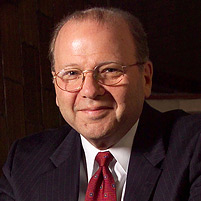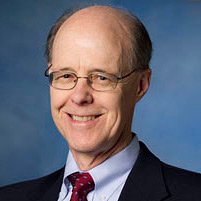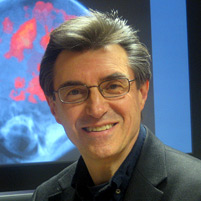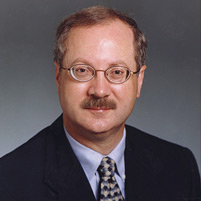Distinction

Whether in engineering, economics, psychology or mathematics, Carnegie Mellon University faculty are on the cutting edge. Four of CMU's finest — Jared Cohon, Dennis Epple, Marcel Just and Steven Shreve — recently earned the university's highest faculty distinction: University Professor.
Jared L. Cohon: Civil and Environmental Engineering and Engineering and Public Policy.
 On June 30, Dr. Cohon will step down as CMU's president after leading the university to unparalleled growth over his 16-year tenure.
On June 30, Dr. Cohon will step down as CMU's president after leading the university to unparalleled growth over his 16-year tenure.
"This prestigious honor is based on his truly exceptional scholarly and professional accomplishments outside of and on top of his presidency," noted Provost and Executive Vice President Mark S. Kamlet.
Cohon, a member of the National Academy of Engineering and the American Academy of Arts and Sciences, is an expert on environmental and water resource systems analysis, a field that combines engineering, economics and applied mathematics. His work has included water resource problems in the US, South America and Asia, energy facility siting and nuclear waste shipping and storage.
President Bill Clinton appointed Cohon to the Nuclear Waste Technical Review Board in 1995 and to the chairmanship in 1997. President George W. Bush named Cohon to the Homeland Security Advisory Council in 2002, with President Barack Obama reappointing him in 2009.
His honors include the 2011 National Engineering Award from the American Association of Engineering Societies.
Dennis Epple: Economics
 Professor Epple is currently the Thomas Lord Professor of Economics and head of the economics program.
Professor Epple is currently the Thomas Lord Professor of Economics and head of the economics program.
"Dennis is clearly one of the leading public economists of his generation and his body of research exemplifies the interdisciplinary spirit at Carnegie Mellon," said Robert M. Dammon, dean of the Tepper School of Business. "In addition to the quality of his research, Dennis is also an exceptional teacher."
A faculty member since 1974, Epple's work combines the principles of economics with other disciplines, such as organizational behavior, operations research and political science, to develop new approaches to policy questions. He has made fundamental contributions to the field on topics including learning curves, hedonic regressions, the economics of education and mobility and redistribution.
Epple has served on the editorial boards of several premier academic publications, was elected a fellow of the Econometric Society in 2003, and has held a variety of official university positions including head of economics and acting dean of the Tepper School of Business.
His honors include the George Leland Bach Teaching Award in recognition of excellence in the classroom.
Marcel Just: Psychology
 Professor Just is the D. O. Hebb Professor of Psychology and director of CMU's brain-imaging facility and the Center for Cognitive Brain Imaging.
Professor Just is the D. O. Hebb Professor of Psychology and director of CMU's brain-imaging facility and the Center for Cognitive Brain Imaging.
"Marcel Just is one of the leading researchers in the field of brain science," said John Lehoczky, dean of the Dietrich College of Humanities and Social Sciences. "His research has had tremendous impact on the use of brain imaging."
An internationally renowned neuroscientist, Just has made major contributions toward understanding reading comprehension, autism, dyslexia, multi-tasking and computational modeling.
His eye-fixation research produced a major theory of reading and he recently developed a prominent explanation for autism, involving compromised communication between the frontal cortex and other brain areas.
Just's other groundbreaking discoveries include demonstrating that reading remediation physically changes white matter in dyslexic children's brains and that listening to speech while driving dramatically decreases driving-related brain activity.
With colleague Tom Mitchell, Just applied trailblazing machine-learning techniques to identify thoughts from brain activation signatures, establishing the field of neurosemantics.
Just's honors include the Society for Text and Discourse's Distinguished Scientific Contribution Award and the National Institutes of Health's Senior Scientist Award.
Steven E. Shreve: Mathematical Sciences
 Professor Shreve is the Orion Hoch Professor of Mathematical Sciences.
Professor Shreve is the Orion Hoch Professor of Mathematical Sciences.
A faculty member since 1980, Shreve is internationally recognized for his work in mathematics applied to finance. He has played a key role in laying the foundations for the modern mathematical theory of optimal portfolio construction in the presence of market uncertainty, building on the work of Nobel Laureate Robert Merton.
"Steve Shreve is among the top mathematical finance researchers in the world," said Fred Gilman, dean of the Mellon College of Science. "While his research accomplishments alone would make him worthy of being named a University Professor, he has contributed even more by bringing his expertise to the classroom. His dedication … has made Carnegie Mellon one of the best universities in the field."
Shreve helped found Carnegie Mellon's highly regarded interdisciplinary bachelor's, master's and doctoral programs in computational and mathematical finance, ranked among the top in the country and he has authored many key books on the mathematics of financial derivatives.
His honors include serving as the president of the Bachelier Finance Society, the leading professional society for quantitative finance, and as a fellow of the Institute of Mathematical Statistics.
Related Links: College of Engineering | Dietrich College of Humanities & Social Sciences | Mellon College of Science | Tepper School of Business
